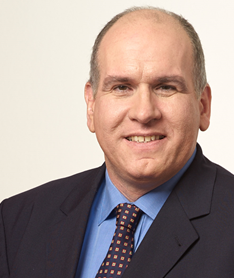Quality Matters Most Says DKMS Chief Medical Officer. Here's Why
Chief Medical Officer Dr. Alexander Schmidt explains why recruiting new potential donors is not the only thing that matters.
INTERVIEW: Chief Medical Officer Dr. Alexander Schmidt explains why recruiting new potential donors is not the only thing that matters.

Q: Why does a stem cell (bone marrow) donor center invest in science and research?
Nowadays, we are far more than just a donor center. It is not enough to recruit as many potential stem cell (bone marrow) donors as possible. Although the therapy options and chances of being cured have improved dramatically in recent years, too many blood cancer patients still die after their stem cell (bone marrow) transplant, due to graft versus host disease, relapses, or other major complications. The better a donor matches a patient with regard to his HLA characteristics and other transplant-relevant factors, the better the prospect of long-term success. That is why we constantly work to improve the chances of finding the perfect match. Often, with patients suffering from acute leukemia for example, the search for a matching stem cell (bone marrow) donor is a race against time. This is why it is so important for donors to be available for their respective patients as quickly as possible.
Q: What are the further goals for the area of medicine & science at DKMS?
We want to continue to increase the number of potential stem cell (bone marrow) donors and to set the database up in a way that allows us to save as many patients as possible. This also includes ethnic diversity, as each ethnic group has its specific frequencies of HLA characteristics. Diversifying our database is extremely important for us and patients all around the world. In addition to this, the quality of the typing of every one of our donors is crucial for transplant centers when they are searching for a matching donor. The quality is already at a very high level but we are determined to continue to improve this. Our goals also include ensuring an even higher and faster availability of all of our 10 million donors. We want to make it as easy as possible for search coordinators from transplant centers to find the best possible match for “their” patients.
Q: What is the “quality of typing results” and why is it so important?
It is all about selecting the best possible donor for a patient in need. The more relevant information we can provide to transplant physicians searching for a donor, the faster they will be able to make a decision. We are investigating what parameters, other than the usual HLA characteristics, are relevant for the success of a stem cell (bone marrow) transplantation. The quality of the typing profile is particularly important, especially when several donors are considered as a potential lifesaver. In recent years, we have continued to include additional parameters to our standard typing profile, based on the latest research results, indicating a relevant role for the success of a stem cell (bone marrow) transplantation. DKMS typing profiles now include 24 HLA characteristics, rather than the usual ten, and other parameters such as KIR and MICA/B. So, we are far above the standard.
Q: To what extent does DKMS conduct its own research?
Our current setup allows us to carry out our own research to fulfill our mission of giving as many patients as possible a second chance at life. Our Clinical Trials Unit (CTU) works closely with the DKMS Life Science Lab, the world´s most innovative and efficient HLA typing lab, and our scientific departments. One of our major achievements was the establishment of the Collaborative Biobank (CoBi), which allows us to store blood samples from donors and patients and to use them in retrospective studies. In addition, we provide financial support for research in the field of allogeneic stem cell (bone marrow) transplantation, for example with the John Hansen Research Grant.
What is more important: to register as many donors as possible or to optimize donor selection?
Both are important. There are many ethnic groups whose HLA characteristics are still significantly underrepresented in the global donor database. This is why we are operating globally in seven countries across five continents to increase the diversity of our donor pool. This enables us to help even more patients around the world. The quality factor also includes looking at younger donors. It is proven that patients who received the transplant from a younger donor have significantly better chances of survival. It is currently assumed that men usually donate higher cell numbers, which is an additional advantage. Therefore, male donors are already more frequently requested by transplant centers. However, every single donor is important, because every one of them could be a lifesaver for a person suffering from blood cancer or other blood disorders.
To learn more about our DKMS Life science lab please visit: https://dkms-lab.de/